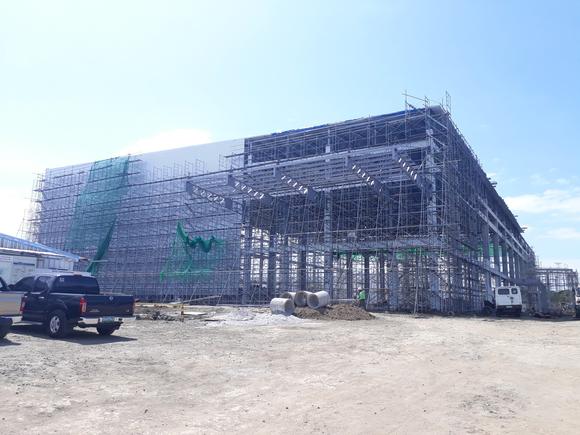
Automakers boosting output in the Philippines
Mitsubishi Motors, Toyota taking advantage of government incentives
The Philippines' auto manufacturing sector is kicking into higher gear as Japan's Mitsubishi Motors prepares to launch a new production line on Friday. An underdeveloped local supply network, however, still detracts from the country's appeal.
The Mitsubishi example
Located in Laguna Province south of the capital Manila, the Mitsubishi plant currently assembles two vehicle models, one of which is the L300 service van. Daily production is 50 units combined. The additional assembly line will add Mirage subcompacts to its repertoire, with a goal of producing 30,000 units a year.
The Japanese automaker is also spending roughly 10 billion yen ($88.1 million) to construct an on-site pressing plant. The facility is due to start up as early as the end of the year. There, Mitsubishi will fabricate roofs, engine hoods, trunks and other large parts that are currently being imported from Thailand. The main plant will eventually procure 50% of its parts locally.
"The steel sheet [for the Mirage] is significantly thinner than the type used for pre-existing vehicle models, which will require advance technological capabilities," explained Yosuke Nishi, first vice president of Mitsubishi Motors Philippines.
Mitsubishi also recognized about 30 outside parts makers as tier-one suppliers. Several, such as Denso, which has manufacturing operations in the Philippines, are fellow Japanese companies. Roughly 10 are local firms, including Manly Plastics and Valerie Products Manufacturing.
The Mitsubishi operation is even attracting other Japanese parts manufacturers to the Philippines. Shizuoka Prefecture-based Usui has established a new production site at a rented warehouse. There, three technicians will perform final bending work on components shipped from Japan.
Subsidizing growth
Last year, the Philippine auto market expanded 25% to 402,461 vehicles -- or quadruple the sales tally of a decade ago. However, imports made up the bulk of that growth, with the share of domestically made autos declining to 26%. In 2010, six members of the Association of Southeast Asian Nations, including the Philippines, all but eliminated reciprocal import tariffs. That opened up the Philippines to a flood of finished vehicles from Thailand and other places.
Looking to erase the resulting trade deficit and boost employment, the Philippines last year rolled out a 27 billion peso ($540 million) government incentive scheme aimed at automakers that build plants onshore. Mitsubishi's two Mirage models and Toyota Motor's Vios sedan have made the cut for the program, which requires a specific level of local procurement.
Toyota assembles the Vios and the Innova minivan in the Philippines, and it will begin manufacturing the new Vios model covered by the incentives in mid-2018. The Japanese car manufacturer is also installing large pressing equipment to make auto body parts in-country instead of importing them from Thailand. In addition, the automaker will procure more parts locally, such as center consoles.
Cost handicaps

But unlike in Thailand, where automakers can procure core components like engines, the number of parts that can be made in the Philippines is limited. It costs roughly 1.7 million yen to produce one vehicle here, a nearly 200,000 yen premium over Thailand, according to the Philippine Department of Trade and Industry. Expenses associated with imported components account for 49% of the total. That ratio is only 7% in Thailand.
Currently, it is more affordable to import finished cars, even when considering transport and labor costs. Mitsubishi and Toyota have committed to onshore production because the cost savings from expanding local procurement, and the roughly 100,000 yen per vehicle in government subsidies, will offset the handicap.
"We are starting to have prospects for Philippine production to cost less" than imports, said Satoru Suzuki, president of Toyota Motor Philippines.
A model for the rest?
Vietnam, another latecomer to auto manufacturing, could learn from the Philippines. As a member of the ASEAN Economic Community, Vietnam's tariffs are due to be abolished next year. That would likely open the floodgates for vehicles assembled in Thailand and other places.
But the Philippines could also turn out to be a cautionary tale. Ford Motor shuttered its production plant in the country, for one. In addition, one condition for receiving government incentives is production of 200,000 vehicles within six years. Over 30,000 units of the Vios were sold last year, but reaching the threshold with Mirages will be no easy task considering that the model's sales were only about 20,000 units. Mitsubishi will expand its network of dealerships from 48 to 70 by 2020.
Furthermore, the government plans to raise taxes on new vehicle starting in 2018, a potential headwind for sales. - JUN ENDO, Nikkei staff writer +Nikkei Asian Review












